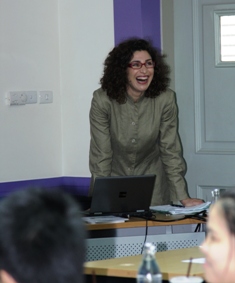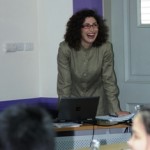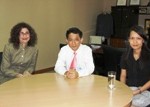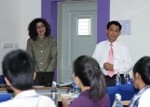
“Over €510 for the taking …. if you have the right project proposal” said Dr. Anastasia during a recent NANO Talk session at NANOTEC. Dr. Anastasia Constantinou, NMP NCP FP7 Contact Point from Greece was commenting on the European research fund FP7 (Framework Programme) budget for 2012 that is available for researchers worldwide. “Thailand is benefiting very well from FP grants and I hope to see proposals in the next call which will come out on July 20”. Dr. Anastasia was in town as part of the FP7 team to promote the research fund for 2012 and 2013.
Dr. Anastasia went on to say that the aims of the Framework Programmes are to strengthen the scientific and technological base of European industry and encourage its international competitiveness while promoting research that supports EU policies.
FP7 is split into four main “specific programmes”:
- Cooperation is the core of FP7, representing two thirds of the overall budget. It fosters collaborative researc across Europe and other partner countries through projects which must be undertaken by transnational consortia, which may include both industry and academia. There are ten key thematic areas: health; food, agriculture and fisheries, and biotechnology; information and communication technologies; nanosciences, nanotechnologies, materials and new production technologies; energy; environment (including climate change); transport (including aeronautics); socio-economic sciences and the humanities; space; security.
- Ideas will support “frontier research” solely on the basis of scientific excellence. Research may be carried out in any area of science and technology, including engineering, socio-economic sciences and the humanities. In contrast with the Cooperation programme, there is no obligation for cross-border partnerships. Projects are implemented by individual teams led by a principal investigator, and operated via the European Research Council (ERC).
- People provides support for researcher mobility and career development, both for researchers inside the EU and internationally. Implemented via a set of Marie Curie Actions which provide fellowships and other measures to help researchers build their skills and competencies throughout their careers. These include: initial training of researchers (Marie Curie Networks); industry-academia partnerships; co-funding of regional, national and international mobility programmes; intra-European fellowships; outgoing and incoming fellowships, an international cooperation scheme and reintegration grants; and the Marie Curie Awards.
- Capacities strengthens the research capacities that Europe needs if it is to become a thriving knowledge-based economy. It covers: research infrastructures; research for the benefits of SMEs; regions of knowledge; research potential; science in society; and specific activities of international cooperation.
For complete information on FP7, please log on: http://cordis.europa.eu/home_en.html



